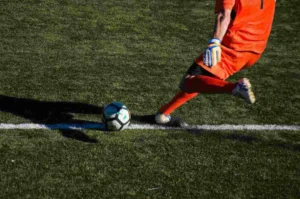Manipulation in sports betting: why has the practice grown in Brazilian sports?
Written by :
Mariana Chamellete

Sports are one of the biggest (perhaps the biggest) sources of entertainment in the world. Its prominent place divides people’s attention alongside music, cinema, streaming, among others.
What sets sport apart from the gaming industry is its unpredictability.
Unlike a film, for example, whose outcome is already established, interest in a football game, a tennis match or an MMA fight is supported by doubt, uncertainty and the unpredictable.
If your soul lies in unpredictability, match-fixing represents the greatest risk of all in sports.
Match-fixing not only compromises the fairness of sports, but also its very existence, as it can lead to a genuine loss of interest among people, who only watch matches and fights because they believe they are seeing history being written there, before their eyes.
Within this plot, football undeniably plays a leading role.
For this reason, this first article, the column’s debut, briefly establishes the general panorama on the regulation of manipulation in football and the (non) regulation of the betting market in Brazil.
Manipulation in sport
Manipulation in sports has existed since the activity began in its organized form. Domestic legislation and national and international federations have sought to curb this practice since its inception.
The recent focus on manipulation has been due to the greater popularization of sport as a form of entertainment and the increased presence of betting houses.
Obviously, there is a direct correlation between betting and match-fixing.
There would be no interest in the arrangement project if there were no financial consideration.
Betting in Brazil was initially considered a criminal offense (classification given to “minor” crimes, less serious) in the enactment of Decree-Law No. 3,688/1941. Betting was then equated to gambling.
In 2018, under the leadership of former President Michel Temer’s government, Law No. 13,756/2018 was enacted, bringing sports betting into the realm of legality.
This time, bets were compared to lotteries.
Lack of regulation
Despite allowing sports betting, the law made its exploitation subject to future regulation. And, as we know, such regulation has not yet occurred.
As a result of this harmful mix (resulting from legislative inertia) of allowing betting with the impossibility of exploring it in national territory, a scenario has been created in which sports betting is growing – and a lot – in the country, but betting houses and websites are based abroad.
In this context, the operators of the houses/sites are exempt from Brazilian legislation and the Judiciary, as well as shielded from national inspection and taxation.
These consequences will be the subject of another article that will be published in this column.
The fact is that, with the resurgence of sports betting, perverse incentives to manipulate bets and results naturally increase.
After all, there is now more money on the table to influence people linked to sport to join (anti)sporting arrangements.
It is no surprise that recently, we have been following the development of Operation Maximum Penalty, which is now in its second phase.
Although sports betting is not regulated, manipulation of bets and results is severely punished in several areas.
Specifically in football, those involved in manipulation schemes may be subject to disciplinary sanctions, civil and labor consequences, as well as criminal penalties.
From a criminal perspective, those involved in match-fixing schemes were subject to the penalties provided for in the types of articles 41-C, 41-D and 41-E of Law No. 10,671/03, introduced into the Fan Statute, and which were reproduced in articles 198, 199 and 200 of the recently published General Sports Law (Law No. 14,597/2023).
What does the law say?
In terms of discipline, administrative sanctions are provided for in the Brazilian Code of Sports Justice (art. 241, art. 242, art. 243 and art. 243-A), in the CBF General Competition Regulations and in the FIFA Code of Ethics, and may even result in a lifetime ban from the sport.
Furthermore, such people may suffer civil consequences, in the form of payment of compensation to institutions that may have been harmed, and labor consequences, such as termination of contracts for just cause carried out by the respective contractor (this may be a football club, the national arbitration committee of the CBF, among several other entities that operate in the football industry).
With the current legislation on match-fixing, the work now passes to the supervisory and judging/sanctioning bodies to enforce the regulatory and legal provisions.
At the same time, it is up to clubs, federations and all those involved in the sport to work to strengthen the culture of respect for the unpredictability of matches.
On the other hand, the current government is expected to regulate sports betting, giving substance to the framework brought by Law No. 13,756/2018.
The Ministry of Finance has already forwarded a proposal for a Provisional Measure for analysis by the Presidency of the Republic. We will be keeping an eye on it!
